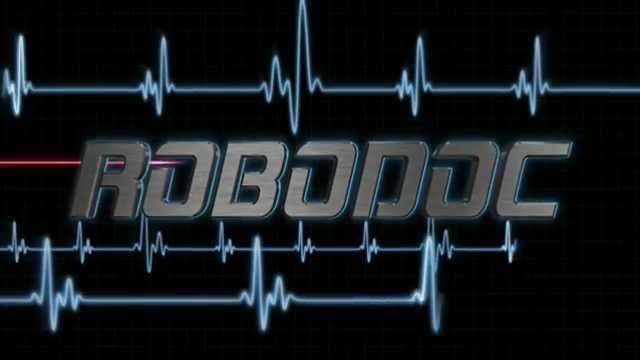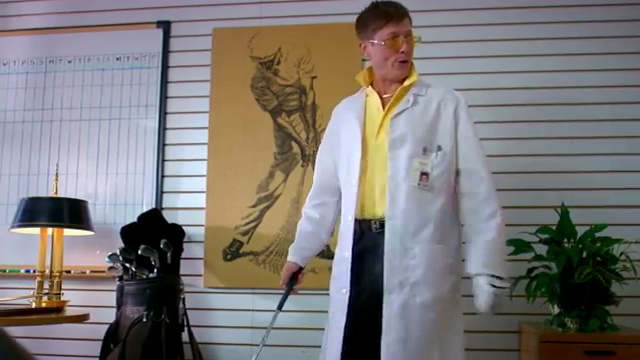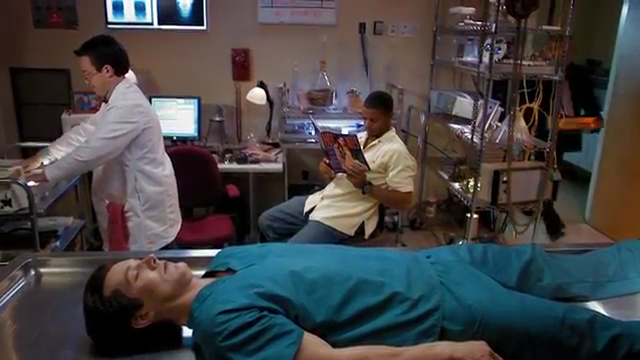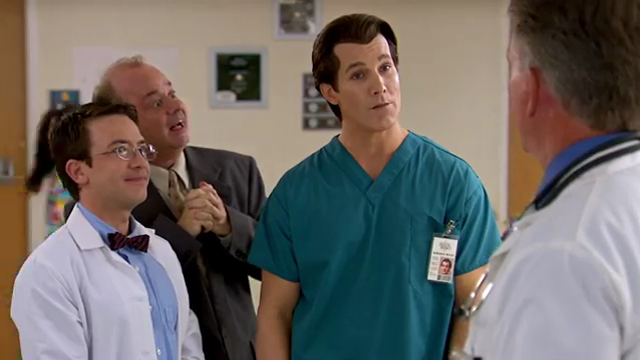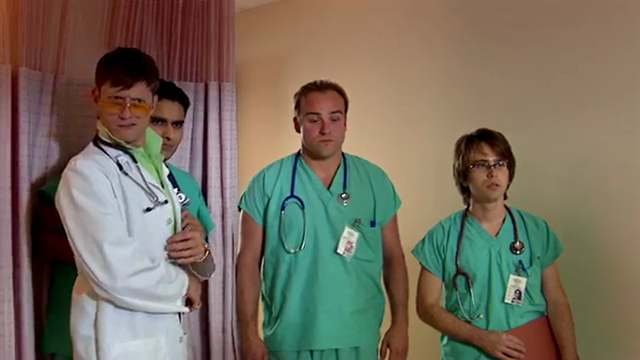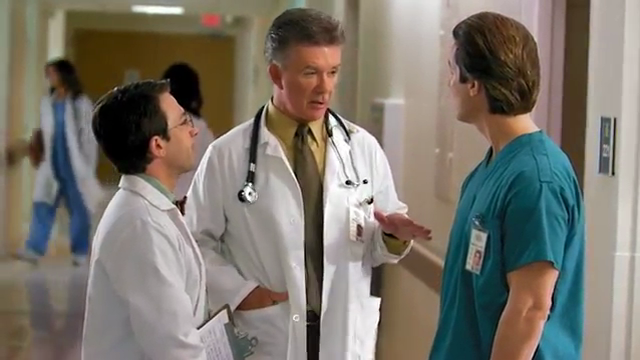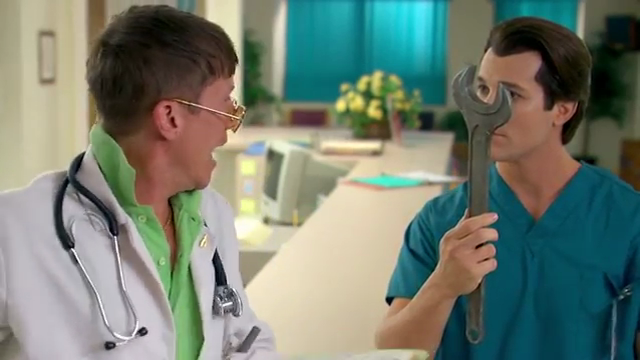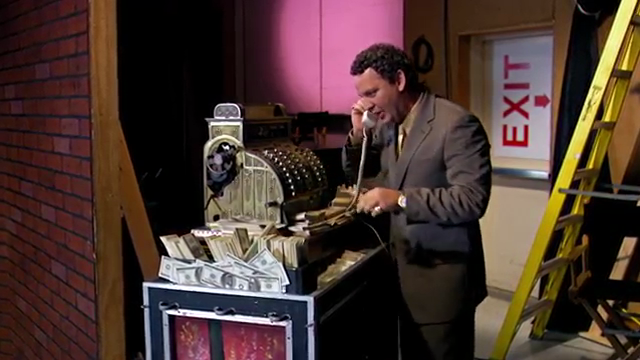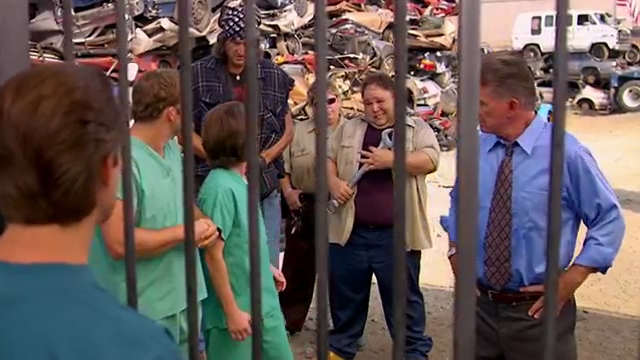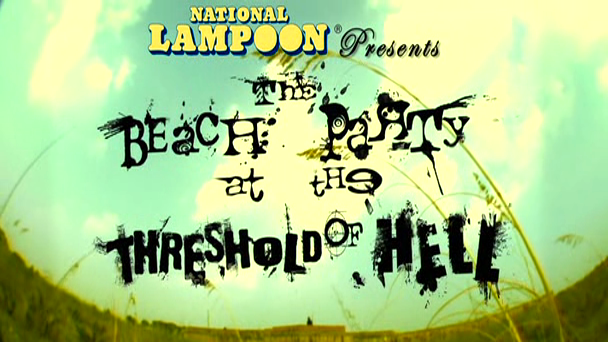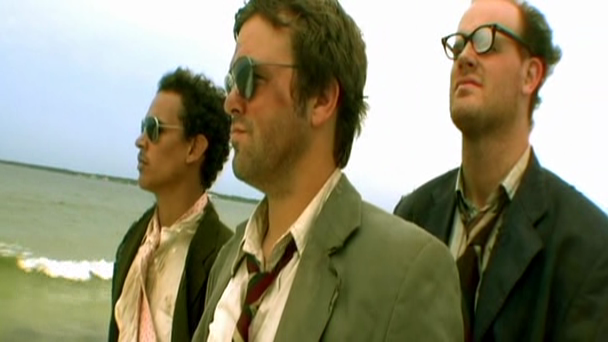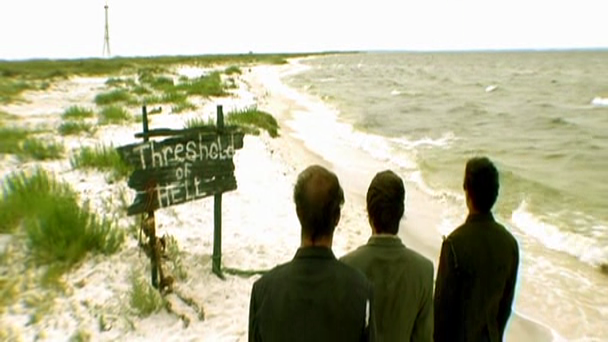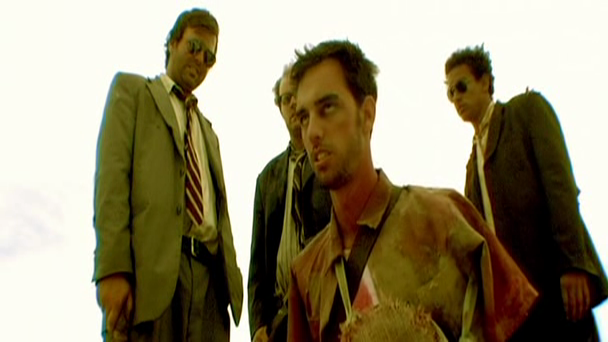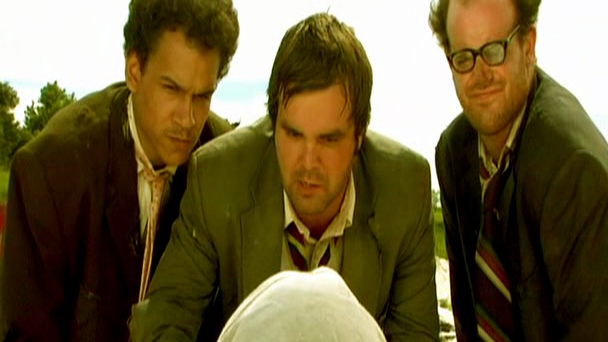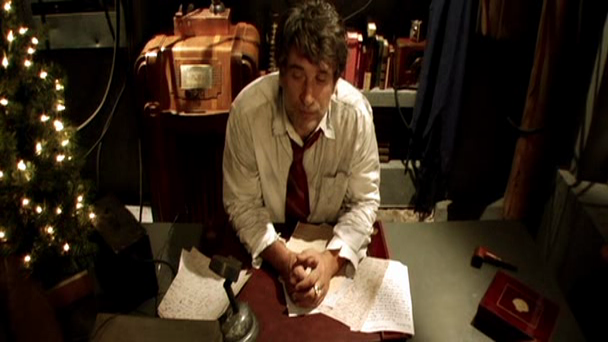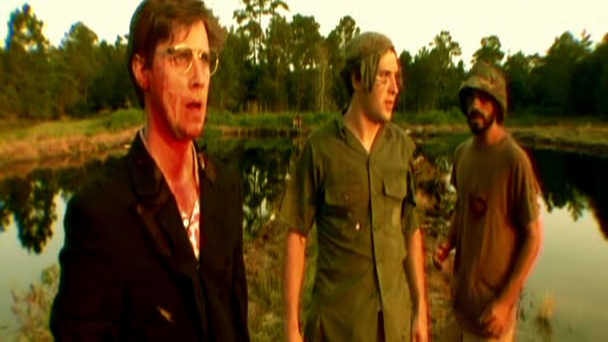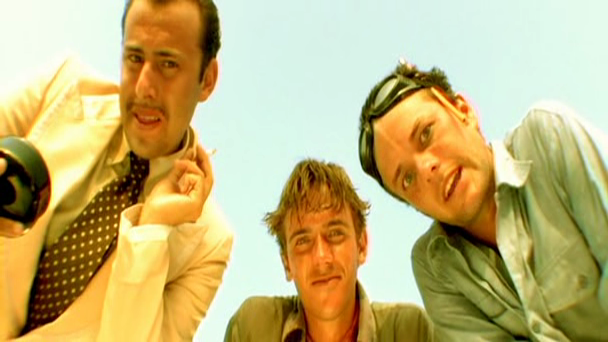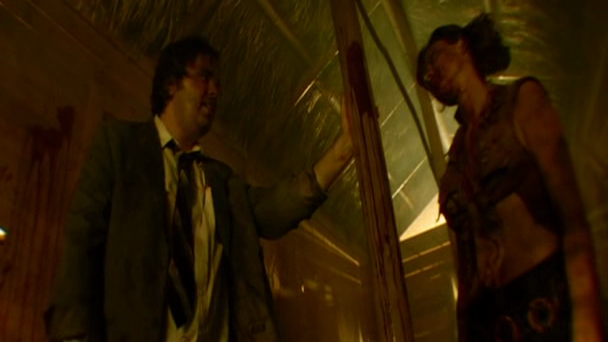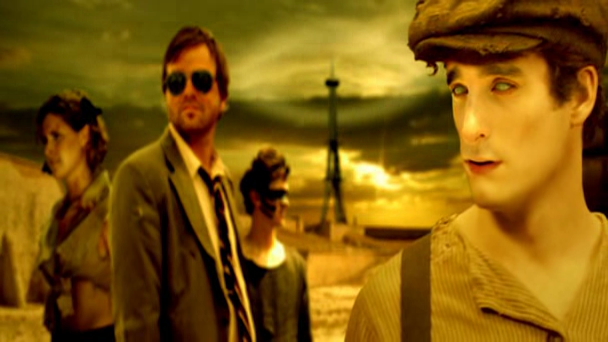-
#537 – National Lampoon’s Men in White (1998)
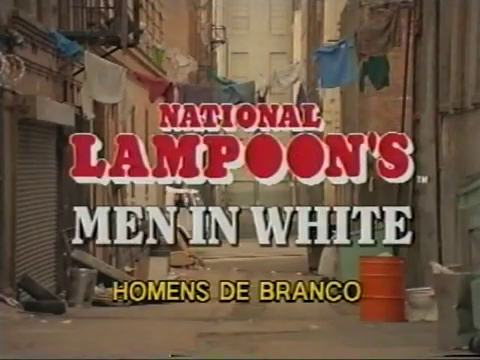
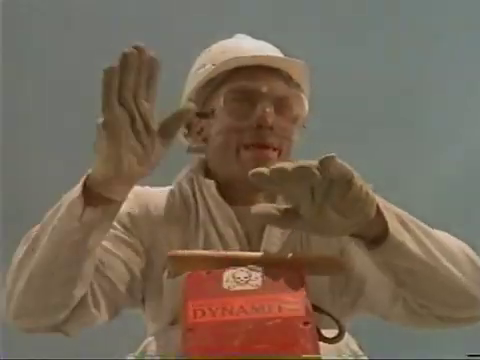
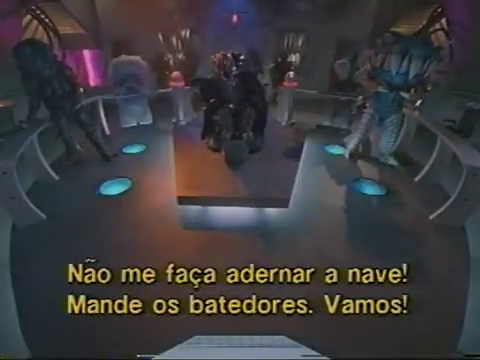
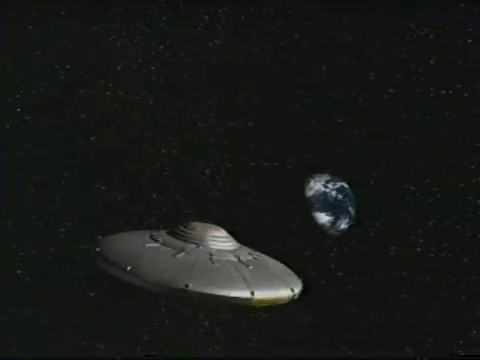
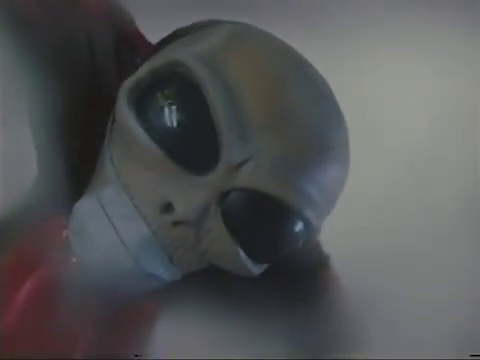
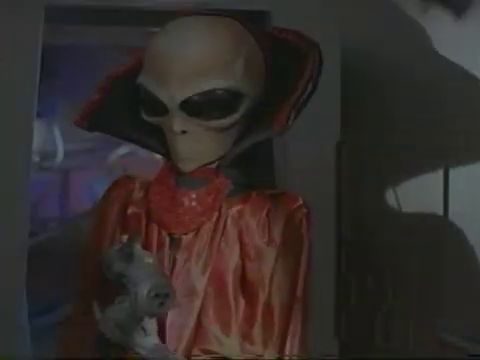
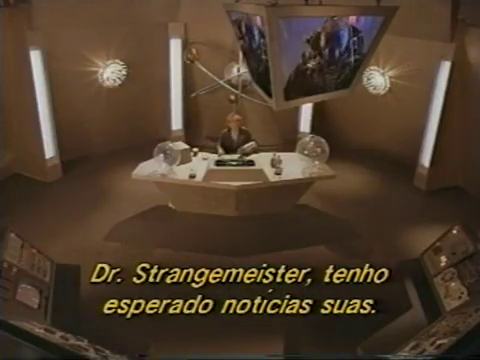
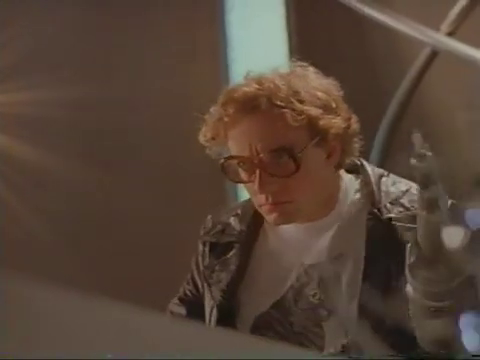
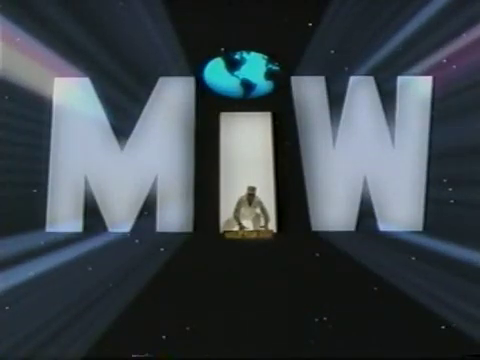
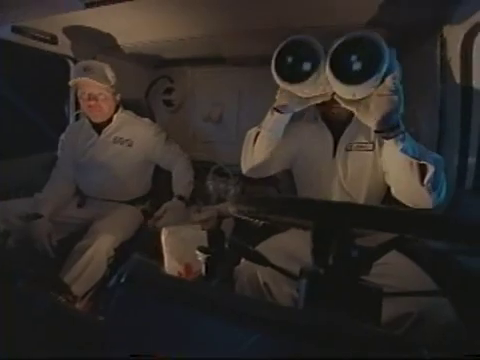
National Lampoon’s Men in White (1998)
Film review #537
Director: Scott P. Levy
SYNOPSIS: Two low-ranking garbage men are abducted by aliens that intend to launch a full-scale invasion of earth. They manage to escape, but are immediately recruited by the government to put a stop to the invasion. However, there are mysterious forces at work that do not want them to succeed…after all, who would put two garbage men in charge of saving the world?
THOUGHTS/ANALYSIS: National Lampoon’s Men in White is a 1998 sci-fi comedy film that is unsurprisingly a parody of the 1997 film Men in Black. The film centres around two garbage men, Roy DuBro and Ed Klingbottom, who are abducted by aliens led by Glaxxon, who intends to invade the Earth with his army. They manage to escape the alien’s clutches, but are almost immediately recruited by the government to stop the invasion by Dr. Strangemeister, who has secretly selected the lowest, most inept government officials to deal with the invasion and fail, since he is secretly working with them. The film is, as the title suggests, a parody of the man in Black film that was released a year earlier, but it is a very loose parody, poking fun at other science-fiction films including Independence Day. The plot is very simple, but it’s just a vehicle for all the gags and comedy, so it’s easy enough to follow. The one thing I’m not sure about is who this film is really aimed at: it has a P.G. rating, and there’s no real adult humour or language, but there’s a fair amount of references that younger viewers probably wouldn’t get. If you’re watching it as a Men in Black parody, there’s enough references throughout the film, and plenty of visual gags that, while nothing special, are still decent. There’s a fair amount of more subtle gags, such as the scenery changing through the President’s windows every scene, which is quite funny, and it reminds me of the Naked Gun films in that no one ever references them. The mix of visual gags, fourth-wall breaking, and slapstick humour is a lot of different techniques that makes threading the film as a whole together problematic; but again, as it’s a comedy-parody film, you can probably just enjoy it for the different gags. Having the National Lampoon’s title attached to it also suggests it would be targeted for an older audience as many of the films are, but I don’t think this is meant to be the case.
The film was produced by Saban International, who most notably do the Power Rangers series, and the aliens and effects definitely have that look and feel about them. Karim Prince, who plays Roy DuBro, also starred in one of the Power Rangers series. There’s a decent mix of CG that doesn’t look too bad for the time, and practical effects that work fairly well. Overall, the film is a mish-mash of different gags that doesn’t really tie together too well, but has a few good jokes (like the scene which makes fun of the Men in Black “neuralyser” that wipes memories). I think the cast is decent enough (apart from the lazy German stereotype of Dr. Strangemeister), but they’re not given too much to do other than delivering bad jokes. It’s not a gripping film, and there’s very little of substance, But I guess for a family film there’s different references and humours for different viewers so I suppose that’s good? I’m not sure anyone who hasn’t watched Men in Black or Independence Day or the like will really appreciate or enjoy it, and it’s references make it a dated film that diminish the humour of the film to modern viewers.
-
#362 – RoboDoc (2008)
RoboDoc (2008)
Film review #362
Director: Stephen Maddocks
SYNOPSIS: A hospital is being constantly plagued by lawsuits from a greedy ambulance-chasing attorney. With another doctor quitting and the hospital fast running out of money, Dr. Roskin arranges for a new doctor to be sent, but doesn’t expect R.I.P. Healthcare to send a robot doctor, who is seemingly able to carry out medical duties without ever making a mistake. This causes problems for Jake Gorman, the attorney who is making money off all the malpractice cases, and working with Dr. Callaby, another doctor at the hospital who is in league with Gorman, the two try to find a way to stop “RoboDoc” before their money-making scheme is ruined…
THOUGHTS/ANALYSIS: RoboDoc is a 2008 sci-fi comedy film that somewhat parodies the RoboCop films, as the name implies. The film starts out introducing Jake Gorman, an ambulance chasing attorney who has made himself rich by suing doctors for malpractice. His constant lawsuits are pushing the North Mercy (or “No Mercy”) hospital to its limits, with doctors continually quitting and having their lives ruined. The opening of the film consists of a variety of gags and satirical looks at the U.S. healthcare system: from the ambulance-chasing attorneys, the lack of insurance for patients, and the ambulance driver adorning a racesuit, there’s a decent amount of content to get into. RoboDoc was written by two M.D.’s and so obviously they have the necessary experience to write about the setting of the film. I think there was definite potential in the outset to make this film offer a more thorough critique of the healthcare system through a comedic lens, but the film takes it in a completely different route and goes for just another raunchy comedy like so many we’ve seen before. Even in this direction, it needs to push some boundaries in order to be effective, but again it just doesn’t do enough to make it stand out.
After another such incident of a doctor quitting over a lawsuit, Dr. Roskin, the chief of medicine arranges the R.I.P. Healthcare company (who fund the hospital) to send another doctor, which they do, in the form of MD-63, a robotic humanoid doctor who is appointed to the hospital. While Dr. Roskin, a technophile, is reluctant to let a robot do a doctor’s job, he is slowly convinced when he sees that “RoboDoc”, as he is nicknamed, is able to complete any form of care or surgery without mistakes, and thus making him impossible to get sued. This is the core plot of the film, with RoboDoc having to earn the trust of his fellow staff, as well as learn about compassion and the elements of care that go beyond his programming. These are all story elements that have been done to death, and so there are no real surprises here. The character of RoboDoc is also essentially a carbon copy of Data from Star Trek: The Next Generation; right down to the look and voice, which is a recognisable character, but again fails to bring any originality to the RoboDoc role, and doesn’t even satirise it. The actor playing RoboDoc does do a good Data impression though. The character of Attorney Jake Gorman also is well played, and his over-dramatic performances bring some life to the scenes he is in. The rest of the cast are pretty forgettable (apart from the few scenes with the character played by Michael Wimslow from Police Academy), and don’t have much significance in the story. There are the starts of some sub-plots initiated by these characters, but they never really go anywhere, making their roles rather muddled.
RoboDoc is not a high budget film, and has to make do with a fairly limited range of effects. These effects are not particularly convincing, and combined with the uninspiring camera work and wooden acting from some of the actors, you will struggle to take it seriously. There are some positives as I have mentioned, and there are some more obscure references and satirical swipes that are more rewarding than the cheap innuendo jokes. The comedy on the whole does stick mostly to that juvenile, raunchy humour but offers nothing particularly new or memorable. Nevertheless, the film does garner a decent amount of laughs, and so as a comedy film it can’t be said to be a complete failure. RoboDoc is an uninspiring mess for the most part, but there are a few good performances and jokes that make this entertaining enough to watch if you’re not paying too much attention to some of the weaker characters and scattered story that often branches into meaningless dead ends.
-
#359 – The Beach Party at the Threshold of Hell (2006)
The Beach Party at the Threshold of Hell (2006)
Film review #359
Director: Jonny Gillette, Kevin Wheatley
SYNOPSIS: Twenty years after nuclear war has destroyed the U.S., the radiation levels outside have dropped to a safe level, and people can venture outside into what is left of the world. Tex Kennedy is on a quest with his two humanoid robots Quincy and Yul to retrieve the man destined to be the new King of America, but to do so they must cross into Hell (which is somewhere on the Florida coast apparently) to find him and face all the evils within…
THOUGHTS/ANALYSIS: The Beach Party at the Threshold of Hell is a 2006 independent post-apocalypse film. The film begins describing the setting of the film, with a mixture of narration and footage. In the year 2074, a nuclear war has rendered the surface of the United States uninhabitable, leaving all survivors stuck in underground bunkers. Twenty years later, the radiation has declined enough so that humans can venture outside. Tex Kennedy, having left his bunker, is now on a quest to follow the guidance of Clark Remington, a man who broadcast on the radio to the bunkers, who proclaimed his nephew Benny the new King of America, and Kennedy is on a mission to retrieve him and in the process become Vice-King. The story is told in a number of ways: through narration, through a kind of mock-documentary, with presenters/authors telling the history of what happened, and through the action itself. All these different methods of storytelling are constantly overlapping and cutting away from each other, which makes the film honestly feel like a bit of a mess. Maybe that’s because the film isn’t really sure about how to portray itself: I think it’s supposed to be a comedy, but there’s an awful lot of backstory and flashbacks that really makes a considerable effort to flesh out the story and the setting, but ultimately doesn’t really matter. For a film that is only ninety minutes long, it spends a lot of time explaining what is going on, and seemingly trying to justify itself by inventing this grand narrative that doesn’t really go anywhere, leading to a but of a confusing mess. I could forgive it if the film identified itself as more of a comedy film that treated the backstory as secondary, but the fact that it spends so much time setting up this world doesn’t really allow that as an excuse.
So Ted and his robot security guards arrive at the “Threshold of Hell”, where Benny Remington is hiding in a bunker, and they have to get him out and journey to a radio tower and broadcast their message to the entire country. However, the threshold of Hell is full of crazed characters that are out to stop them. These characters all have their own personality, but there’s just so many of them they only get a small amount of screen time each. and there’s not much time to really develop their roles. There’s Clark Remington’s son, calling himself Mr. Jackie, who wants to become the king himself after his Father disowned him for basically being a sociopath, and his whole gang, including his sadistic lieutenant. There’s also Yorick Schlatz, who is a cult leader who hosts the beach party at the threshold of hell and who also possess satanic powers that keeps the partygoers immortal and unaffected by the radiation for the past twenty years. Also Fidel Castro’s descendent Javier Castro shows up to create a dynamic with Tex, the descendent of President Kennedy…or he would do, if he stuck around longer. All these bizarre and nonsensical characters all have some potential to do some interesting things, but the film constantly over-explains everything and never lets the characters speak for themselves. Again, if the film is aiming to be a black comedy or focusing on dark humour, then it could have worked, but there’s just not enough focus on what it wants to be.
Being an independent film, you won’t be expecting any spectacular special effects or ambitious cinematography, and you won’t be surprised with what you get. The camera is all over the place and can barely frame a shot most of the time, the scenes that are filmed in front of a green screen are blindingly obvious, and the acting is pretty wooden throughout. One more surprising element in the film is that it is quite gory. Even though the blood and guts look obviously fake, it further still confuses the tone when it is trying to be funny and then someone’s organs get ripped out. There’s a scene in the middle of the film involved with a giant snake of some sort and the film instantly switches to a hand drawn animation sequence for about twenty seconds with no set-up or transition and it just feels like an acknowledgement that the film could not make this scene any other way, and just tacked in this sequence just to fill the gap. Overall, The Beach Party at the Threshold of Hell feels like it is trying to do far too much with far too little. It feels indecisive with regards to the tone of the film or what genre it is trying to establish itself within. Far too much time is spent describing characters and backstory instead of letting the film show it, and the constant interruption to the story to expand on these elements is distracting and makes retaining focus and interest in the film difficult. It has one or two laughs, but there’s nothing really worthwhile here.
Also, the film ends with the teasing words “end of part one”, which suggests more to come, but a sequel was never made, which is probably for the best.
